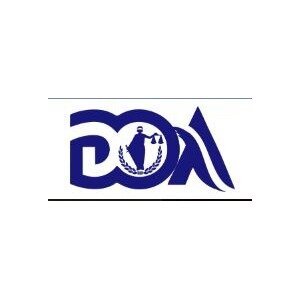Best Tax Increment Financing Lawyers in Ikoyi
Share your needs with us, get contacted by law firms.
Free. Takes 2 min.
List of the best lawyers in Ikoyi, Nigeria
About Tax Increment Financing Law in Ikoyi, Nigeria
Tax Increment Financing (TIF) is a financial tool used by municipalities to encourage economic development and improve infrastructure in designated areas. In Nigeria, and particularly in Ikoyi, TIF allows for the redirection of future tax revenues generated from an increase in property values back into community projects. These projects may include road construction, public facilities, and other infrastructure upgrades which aim to revitalize areas and stimulate economic growth.
Why You May Need a Lawyer
Engaging with Tax Increment Financing can be complex, involving several legal aspects and stakeholders. Here are some common situations where legal assistance may be crucial:
- Determining eligibility for TIF funds for a specific project.
- Navigating the application process and meeting all regulatory requirements.
- Negotiating terms with government bodies or private entities involved in the TIF project.
- Ensuring compliance with local laws and regulations regarding land use and development.
- Resolving disputes that may arise during the implementation of TIF projects.
Local Laws Overview
Local laws in Ikoyi related to TIF emphasize transparency, accountability, and responsible urban development. Key aspects include:
- Requirement for comprehensive project proposals including cost-benefit analysis.
- Adherence to urban and regional planning laws specific to Lagos State.
- Mandatory public hearings to consider community impact and consultation.
- Clear criteria and processes for the allocation and use of TIF funds.
- Regular audits and assessments to ensure funds are used as intended.
Frequently Asked Questions
What is Tax Increment Financing?
Tax Increment Financing is a public financing method that is used as a subsidy for community-improvement projects, encouraging redevelopment in underutilized areas.
Who can apply for TIF in Ikoyi, Nigeria?
Property developers, municipal governments, and occasionally non-profit organizations that have projects aligned with community improvement goals can apply for TIF.
What are the benefits of TIF for the community?
TIF can lead to improved infrastructure, increased property values, job creation, and economic revitalization of an area.
Are there risks associated with TIF?
Yes, risks include the potential for increased public debt, misallocation of funds, and failure to achieve projected developments or economic benefits.
How does TIF affect property taxes?
While TIF does not directly increase property taxes, it redirects increased taxes from higher property values to fund the TIF project.
What is the typical duration for a TIF project?
TIF projects can be authorized for varying lengths of time, often between 15 to 30 years, depending on the project scope and local law.
What legal documentation is required for TIF?
Documentation includes project proposals, legal agreements, land use plans, financial assessments, and public notices, among others.
Can TIF be used for residential projects?
TIF is typically used for commercial development but can be applied to residential projects if they meet certain redevelopment criteria.
How can disputes in TIF projects be resolved?
Disputes can be resolved through negotiation, mediation, or legal proceedings facilitated by experienced lawyers specializing in TIF law.
What makes a TIF proposal successful?
A successful TIF proposal clearly outlines the economic benefits, compliance with zoning laws, community support, and detailed financial plans.
Additional Resources
For more information and assistance, consider reaching out to the following:
- Lagos State Ministry of Physical Planning and Urban Development: Provides guidelines and regulations related to urban development.
- Nigerian Institute of Town Planners: Offers guidance and resources for sustainable town planning.
- Local Chambers of Commerce: Can provide valuable insights and networking opportunities with stakeholders involved in TIF projects.
- Legal Consultants: Specialized in Nigerian land and finance law, offering services to navigate TIF-related legal matters.
Next Steps
If you are considering pursuing a TIF project or need legal assistance, follow these steps:
- Identify and consult with a lawyer who specializes in tax and finance law within Nigeria, particularly with experience in TIF projects.
- Gather relevant documentation and project plans to discuss with your legal advisor.
- Engage with local community and government representatives to understand TIF criteria and garner support.
- Ensure thorough review and understanding of all legal agreements before proceeding with the application process.
- Regularly communicate with all stakeholders involved to ensure transparency and accountability throughout the project's lifecycle.
Lawzana helps you find the best lawyers and law firms in Ikoyi through a curated and pre-screened list of qualified legal professionals. Our platform offers rankings and detailed profiles of attorneys and law firms, allowing you to compare based on practice areas, including Tax Increment Financing, experience, and client feedback.
Each profile includes a description of the firm's areas of practice, client reviews, team members and partners, year of establishment, spoken languages, office locations, contact information, social media presence, and any published articles or resources. Most firms on our platform speak English and are experienced in both local and international legal matters.
Get a quote from top-rated law firms in Ikoyi, Nigeria — quickly, securely, and without unnecessary hassle.
Disclaimer:
The information provided on this page is for general informational purposes only and does not constitute legal advice. While we strive to ensure the accuracy and relevance of the content, legal information may change over time, and interpretations of the law can vary. You should always consult with a qualified legal professional for advice specific to your situation.
We disclaim all liability for actions taken or not taken based on the content of this page. If you believe any information is incorrect or outdated, please contact us, and we will review and update it where appropriate.










